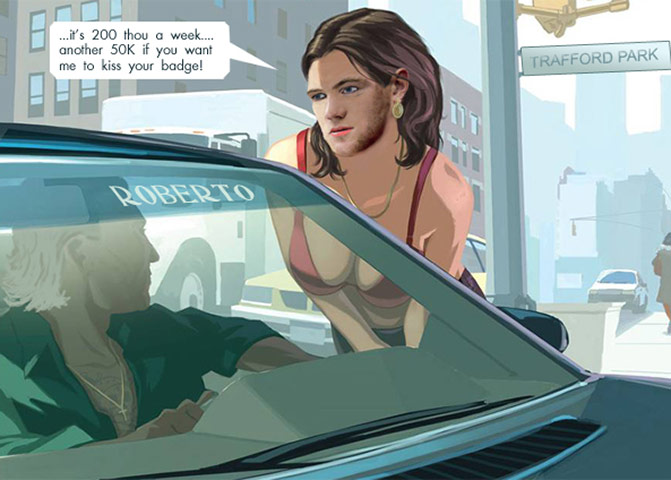Of course this is a trick question, but it does make you think about things. The nice Colonel who only stays in his Bedouin Tent, regardless of where in the world he is (and of course he needs his blonde 'nurse' with him at all times), or Phoney Tony, he who believes that religion isn't a cause of war!! Exactly which one is more deluded that is the question?
The answer is BOTH!!!
Monday, November 29, 2010
Friday, November 26, 2010
Put down of the week
 I really don't like George W. Bush, but his missus deserves a prize for this one!! The former First Lady had said in a much-publicised appearance on Larry King Live:
I really don't like George W. Bush, but his missus deserves a prize for this one!! The former First Lady had said in a much-publicised appearance on Larry King Live:Palin has recently messed up (again) describing North Korea as an American Ally"I sat next to her [Palin] once, thought she was beautiful. And I think she's very happy in Alaska - and I hope she'll stay there.
Wednesday, November 24, 2010
Another amusing thing!
Apparently Apple and Steve Jobs aren't too pleased about having a 'Steve Jobs' action figure - and probably because they don't get a cut of the $80 price tag!!
You can read more about it here
Thursday, November 18, 2010
I want one!!!
Believe it or not this is actually a coffin, made by a Ghanaian artist - you can see his others here
And then there was five….
As a follow on to my comments the other day comes this – the third fatality from Sunday’s crash, rapidly followed by another incident, this time caused by a less than diligent motorist forcing a cyclist to take evasive action simply because they did not pay enough attention to other road users as they exited their car.
Add to this another story – fortunately not another death (that’s five cyclists killed in four days by the way!) – where a lovely motorist forces a rider into the kerb, causes them to crash, breaking their collar bone and then telling them it was their fault. I too have had the same thing happen to me (minus the injury). I slapped a van once to alert them they were about to grind me into the pavement, only for the driver to stop me a few km along the road to ask what my problem was and to advise he would rip my head off if I touched his lovely van again!
Now, in the last blog I complained about the driving standards – last night I had ANOTHER near miss, rural, female driver, lack of attention, etc. It makes you wonder if you are on borrowed time riding a bike.
Tuesday, November 16, 2010
Another weekend of CARnage
It’s official, being a cyclist in New Zealand is as fun as being a crash test dummy – a dangerous existence not helped by the low quality vehicles on the road (in terms of safety features and serviceability) and the atrocious driving standards.
Last night I was enjoying a leisurely ride with my mate Pete; this involved a trip around the mountain, mainly flat with a steep climb at the end followed by a rapid descent where you can easily (as we did) touch 70kmh. Great fun, until at the only T junction on the road, out ‘drives’ (actually Kangaroos, jumps, stutters or hops might be better descriptions) a white car with young female Maori driver. Avoiding action was required and luckily for Pete and I there was not any on coming traffic as we overtook the silly cow at over 60kmh.
Now I can hear you say “but you were reckless in your actions’!
Well, the speed limit there is 70kmh and we were both under this; we were both wearing hi-vis gear and were, unlike the car driver, paying attention. Furthermore, we had right of way, the car failed to give way and frankly appeared not to give a toss about the near miss she had just been involved in (we could have conceivably rear ended her, but this would have hurt!).
So fortunately Pete and are not statistics, unlike those less fortunate than us this weekend. Three cyclists were struck and killed by cars this weekend. In this article there is an overview of the two incidents (two others were killed last week, making five in a fortnight); now I am obviously biased – as I biker I have had several near misses, last night being the most recent. I also appreciate that the media has to produce stories that balance reporting. But please, the poor car driver (who hit the cyclists so hard she had to be cut from the vehicle), is very distressed! She is a farmers daughter who lives in a nearby farm, the cyclists are on a regular, organised Sunday ride – so, why was she on the wrong side of the road, given that she knows the area, presumably knows cyclists use the road and given it is a rural area she could have hit a milk tanker, a tractor a farm bike – anything in fact! I am guessing because she could, because motorists really only care for themselves and not other road users; and from the ‘gross generalisation’ file comes the next bit. Many bikers have pointed out that young female car drivers are the worst, the least attentive, the least in control, the least likely to see a cyclist and the most likely to take you out. I have deferred from having this opinion – until last night!!
Thursday, November 11, 2010
I found this interesting
Why Britain is poor and Norway is rich
Anyway, makes you wonder about Gerry Brownlee selling off exploration rights to Petrobras
Anyway, makes you wonder about Gerry Brownlee selling off exploration rights to Petrobras
Austerity revisited…
According to this report (OK, so it is actually a syndicated story, hence the references to the US and ‘soda cans’) the UK students protest against the increase in student tuition fees was
the largest street protest yet against the government's sweeping austerity measures.
So yet again I am forced to define what austerity (as seen before in my other blog re this) although I am using a slightly different definition here, the other is still relevant
In economics, austerity is a policy of deficit-cutting, lower spending, and a reduction in the amount of benefits and public services provided. Austerity policies are often used by governments to reduce their deficit spending while sometimes coupled with increases in taxes to pay back creditors to reduce debt.
Governments around the world (the UK and NZ seem to be copying each other) are mainly playing the austerity policy game and at last someone has the sense to publicly challenge this. True, you cannot just print more money, but you do need to think about why you are introducing these measures.
Some of the quotes from the AP article state quite succinctly why people have sound arguments
"Politicians don't seem to care, they should be taking money from people who earn seven-figure salaries, not from students who don't have any money."
"We will not tolerate the previous generation passing on its debts to the next, nor will we pick up the bill to access a college and university education that was funded for them”
So, rather than this being a ‘class war’(as suggested by the likes of the right wing Sky TV News) this is a generation war, those than benefited from the boom years are now being challenged, rightly in my opinion, on the justice of their decisions. Another article provides a clearer insight into the political arguments, the back tracking of the Liberals, conveniently changing policy direction to become bed mates with the Tories. Not unlike the Maori party and their cosy relation with National here in NZ – about time people begin to see through that marriage of convenience.
And to finish - if Austerity involves increasing taxes to repay debt, exactly why is the New Zealand government borrowing money to pay for tax cuts?
Wednesday, November 10, 2010
Losing your child at McDonalds....
Recently there have been a couple of media reports that have caught my attention; added to this I received a link to a very interesting and somewhat disturbing website – not disturbing in any weird or depraved way, but disturbing that people actually are so stupid!
The first story and the second are linked, albeit they are 12000 or so miles apart. Last weekend a two year old girl was found wandering in a car park at a McDonalds in Otara, South Auckland. For those not in the know South Auckland is probably New Zealand’s most deprived community; it has above average unemployment, poor education achievement rates, over crowded housing, high rates of domestic violence, drugs, etc.
Now, a lost two year old isn’t that unusual – what parent hasn’t had a toddler wander off? What is more unusual in this scenario is that it took the family two days to actually front up to authorities and claim their child – their explanation, they thought someone else must be looking after her!
The second story was about something related to the above – the lack of parenting skills in modern society. The generation osmosis of ‘good parenting’ has been lost, with many children raised by surrogates, at day care and the like. Now don’t get me wrong, I am not advocating a ‘keep the mums at home’ campaign, but there is a need for basic common sense parenting to be a pre-requisite for a successful future life. It goes without saying that with kids it is often ‘monkey see, monkey do’, that behaviours good, bad and indifferent are observed, stored in their sponge like minds, to be reproduced at a later date. If poor parenting is the norm it is logical to assume this will escalate and snowball as time progresses, hence we have a generation that are not able to adequately care for children, but don’t actually know when they have been lost!!
The last bit I guess is at a tangent, but could be thought as the glue that needs to hold the lot together. This is something called Health Literacy, which has been defined as
Health literacy is the ability to obtain, process, and understand basic health information and services to make appropriate health decisions (Kōrero Mārama, 2010).
It probably comes as no surprise to find that over 1/3 of the NZ population has been assessed as having poor health literacy – meaning they are unable to make sound health choices, follow medical instruction, understand the requirements of their treatment, and so on. Is it any wonder then that countless health dollars are spent ‘fixing’ these issues?
People with poor health literacy:
- are less likely to use prevention services
- have less knowledge of their illness, treatment, and medicines
- are less likely to recognise the first signs of medical problems
- are less likely to manage their long-term/chronic condition
- are less likely to communicate their concerns to health professionals
- are more likely to be hospitalised due to a chronic condition
- are more likely to use emergency services, and
- are more vulnerable to workplace injury.
Indeed it would be very simplistic to generalize that people with poor health literacy are more likely to leave their child at McDonalds, not claim them for two days and likely have inadequate parenting skills to assist their child out of the poverty trap!
Tuesday, November 2, 2010
A Very Interesting Read!
Some people may know that I don't like the idea of National Standards, as proposed by the National government and their education minister Ann Tolley. I also have held a belief that Canterbury was a place that was dyed in the wool National territory, the kind of place that would endorse all national policy. This link shows quite the opposite.
Monday, November 1, 2010
New Zealand’s Lost Villages
These are all over the place and I’ve visited quite a few. They all share similar traits; they all have seen better days, they all had prosperous industries and, according to one of my work mates, they should have all been bull dozed a long time ago!
Today I visited Te Mahoe, a small settlement in the eastern Bay of Plenty. It is near another town, Kawerau, which itself has seen better days. Te Mahoe apparently was established as a village for two groups of people, those who built the nearby dam and those who originally ran the power plant driven by the water from the dam. But, we now live in a modern, automated age, with the power plant now seemingly run from afar and bereft of actual employees, so Te Mahoe sits silently in the valleys, a small collection of well kept homes, but little else. The small primary school could be the next in line (especially as Kawerau’s schools are to be consolidated into fewer and bigger schools).
What future does Te Mahoe have? No actual sign of work places in the area, the teachers at the school (as well as many of the students) travel to there. It is like a scale model of Turangi or Mangakino, similarly constructed for hydroelectric; Turangi, by virtue of proximity to the ski fields and trout fishing, as well as two large prisons, at least looks like a town that will survive.
There are others of this ilk – Te Kaha, dairy factory gone, tourist ventures failed, it sits in decline; Kaingaroa, once a thriving forest settlement, now it is a collection of near derelict homes – mostly with families living in them. A recent TV news report showed how in the Central North Island sections of land were available for free, as nobody wanted those house section in those villages
So, does the outside world actually know of these places – what is more troublesome is that few in New Zealand really care about these places or the people in them, who sit between the metaphorical rock and a hard place. Whilst we fret over ‘The Hobbit’, there are sections of New Zealand with substandard housing, long term unemployment and no prospect of changes or improvement. Overseas the ‘heritage’ angle would be used, considering these required saving for the benefit of the nation. Maybe the people should be considered the national treasure?
Subscribe to:
Posts (Atom)





